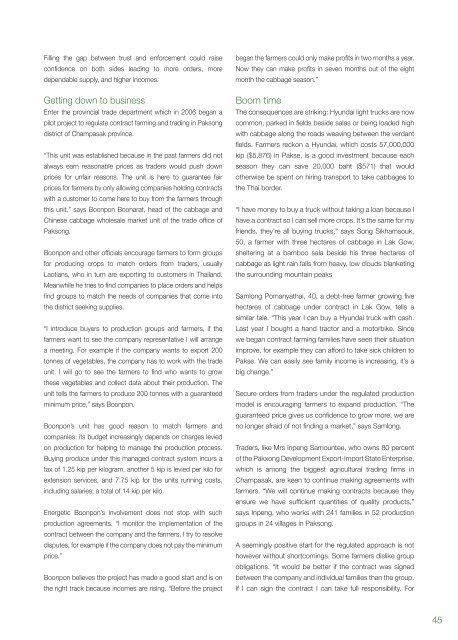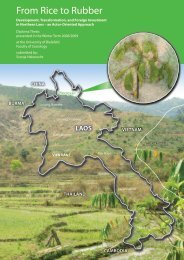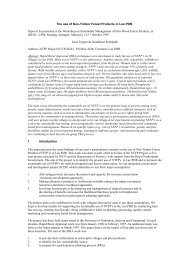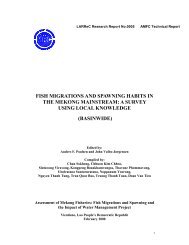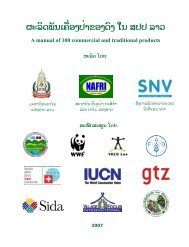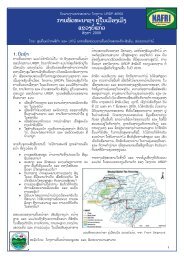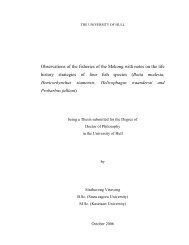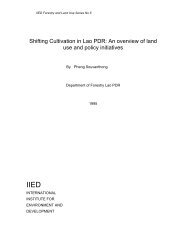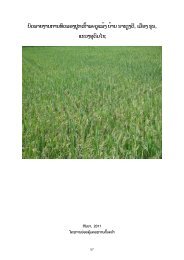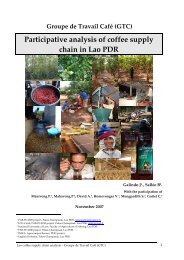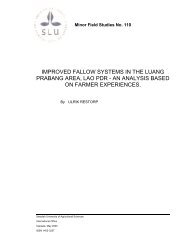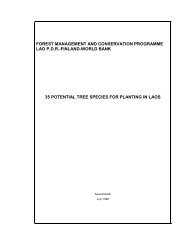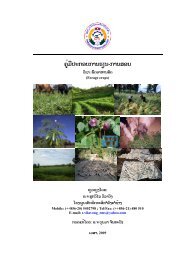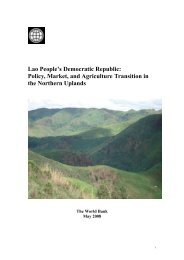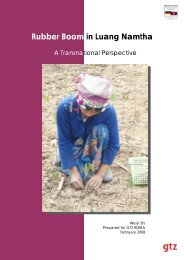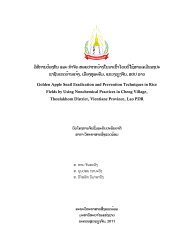Contract Farming in Lao PDR: Cases and Questions - LAD - nafri
Contract Farming in Lao PDR: Cases and Questions - LAD - nafri
Contract Farming in Lao PDR: Cases and Questions - LAD - nafri
You also want an ePaper? Increase the reach of your titles
YUMPU automatically turns print PDFs into web optimized ePapers that Google loves.
Fill<strong>in</strong>g the gap between trust <strong>and</strong> enforcement could raise<br />
confidence on both sides lead<strong>in</strong>g to more orders, more<br />
dependable supply, <strong>and</strong> higher <strong>in</strong>comes.<br />
Gett<strong>in</strong>g down to bus<strong>in</strong>ess<br />
Enter the prov<strong>in</strong>cial trade department which <strong>in</strong> 2006 began a<br />
pilot project to regulate contract farm<strong>in</strong>g <strong>and</strong> trad<strong>in</strong>g <strong>in</strong> Paksong<br />
district of Champasak prov<strong>in</strong>ce.<br />
“This unit was established because <strong>in</strong> the past farmers did not<br />
always earn reasonable prices as traders would push down<br />
prices for unfair reasons. The unit is here to guarantee fair<br />
prices for farmers by only allow<strong>in</strong>g companies hold<strong>in</strong>g contracts<br />
with a customer to come here to buy from the farmers through<br />
this unit,” says Boonpon Boonarat, head of the cabbage <strong>and</strong><br />
Ch<strong>in</strong>ese cabbage wholesale market unit of the trade office of<br />
Paksong.<br />
Boonpon <strong>and</strong> other officials encourage farmers to form groups<br />
for produc<strong>in</strong>g crops to match orders from traders, usually<br />
<strong>Lao</strong>tians, who <strong>in</strong> turn are export<strong>in</strong>g to customers <strong>in</strong> Thail<strong>and</strong>.<br />
Meanwhile he tries to f<strong>in</strong>d companies to place orders <strong>and</strong> helps<br />
f<strong>in</strong>d groups to match the needs of companies that come <strong>in</strong>to<br />
the district seek<strong>in</strong>g supplies.<br />
“I <strong>in</strong>troduce buyers to production groups <strong>and</strong> farmers, if the<br />
farmers want to see the company representative I will arrange<br />
a meet<strong>in</strong>g. For example if the company wants to export 200<br />
tonnes of vegetables, the company has to work with the trade<br />
unit. I will go to see the farmers to f<strong>in</strong>d who wants to grow<br />
these vegetables <strong>and</strong> collect data about their production. The<br />
unit tells the farmers to produce 200 tonnes with a guaranteed<br />
m<strong>in</strong>imum price,” says Boonpon.<br />
Boonpon’s unit has good reason to match farmers <strong>and</strong><br />
companies: its budget <strong>in</strong>creas<strong>in</strong>gly depends on charges levied<br />
on production for help<strong>in</strong>g to manage the production process.<br />
Buy<strong>in</strong>g produce under this managed contract system <strong>in</strong>curs a<br />
tax of 1.25 kip per kilogram, another 5 kip is levied per kilo for<br />
extension services, <strong>and</strong> 7.75 kip for the units runn<strong>in</strong>g costs,<br />
<strong>in</strong>clud<strong>in</strong>g salaries; a total of 14 kip per kilo.<br />
Energetic Boonpon’s <strong>in</strong>volvement does not stop with such<br />
production agreements. “I monitor the implementation of the<br />
contract between the company <strong>and</strong> the farmers, I try to resolve<br />
disputes, for example if the company does not pay the m<strong>in</strong>imum<br />
price.”<br />
Boonpon believes the project has made a good start <strong>and</strong> is on<br />
the right track because <strong>in</strong>comes are ris<strong>in</strong>g. “Before the project<br />
began the farmers could only make profits <strong>in</strong> two months a year.<br />
Now they can make profits <strong>in</strong> seven months out of the eight<br />
month the cabbage season.”<br />
Boom time<br />
The consequences are strik<strong>in</strong>g: Hyundai light trucks are now<br />
common, parked <strong>in</strong> fields beside salas or be<strong>in</strong>g loaded high<br />
with cabbage along the roads weav<strong>in</strong>g between the verdant<br />
fields. Farmers reckon a Hyundai, which costs 57,000,000<br />
kip ($5,876) <strong>in</strong> Pakse, is a good <strong>in</strong>vestment because each<br />
season they can save 20,000 baht ($571) that would<br />
otherwise be spent on hir<strong>in</strong>g transport to take cabbages to<br />
the Thai border.<br />
“I have money to buy a truck without tak<strong>in</strong>g a loan because I<br />
have a contract so I can sell more crops. It’s the same for my<br />
friends, they’re all buy<strong>in</strong>g trucks,” says Song Sikhamsouk,<br />
50, a farmer with three hectares of cabbage <strong>in</strong> Lak Gow,<br />
shelter<strong>in</strong>g at a bamboo sala beside his three hectares of<br />
cabbage as light ra<strong>in</strong> falls from heavy, low clouds blanket<strong>in</strong>g<br />
the surround<strong>in</strong>g mounta<strong>in</strong> peaks<br />
Samlong Pomanyathai, 40, a debt-free farmer grow<strong>in</strong>g five<br />
hectares of cabbage under contract <strong>in</strong> Lak Gow, tells a<br />
similar tale. “This year I can buy a Hyundai truck with cash.<br />
Last year I bought a h<strong>and</strong> tractor <strong>and</strong> a motorbike. S<strong>in</strong>ce<br />
we began contract farm<strong>in</strong>g families have seen their situation<br />
improve, for example they can afford to take sick children to<br />
Pakse. We can easily see family <strong>in</strong>come is <strong>in</strong>creas<strong>in</strong>g, it’s a<br />
big change.”<br />
Secure orders from traders under the regulated production<br />
model is encourag<strong>in</strong>g farmers to exp<strong>and</strong> production. “The<br />
guaranteed price gives us confidence to grow more, we are<br />
no longer afraid of not f<strong>in</strong>d<strong>in</strong>g a market,” says Samlong.<br />
Traders, like Mrs Inpeng Samountee, who owns 80 percent<br />
of the Pakxong Development Export-Import State Enterprise,<br />
which is among the biggest agricultural trad<strong>in</strong>g firms <strong>in</strong><br />
Champasak, are keen to cont<strong>in</strong>ue mak<strong>in</strong>g agreements with<br />
farmers. “We will cont<strong>in</strong>ue mak<strong>in</strong>g contracts because they<br />
ensure we have sufficient quantities of quality products,”<br />
says Inpeng, who works with 241 families <strong>in</strong> 52 production<br />
groups <strong>in</strong> 24 villages <strong>in</strong> Paksong.<br />
A seem<strong>in</strong>gly positive start for the regulated approach is not<br />
however without shortcom<strong>in</strong>gs. Some farmers dislike group<br />
obligations. “It would be better if the contract was signed<br />
between the company <strong>and</strong> <strong>in</strong>dividual families than the group.<br />
If I can sign the contract I can take full responsibility. For<br />
45


